|
Books Should Be Free Loyal Books Free Public Domain Audiobooks & eBook Downloads |
|
|
Books Should Be Free Loyal Books Free Public Domain Audiobooks & eBook Downloads |
|
Top Authors |
|---|
|
Book type:
Sort by:
|
By: Edward Ellis Morris (1843-1902) | |
|---|---|
 Early Hanoverians
Early Hanoverians
In this short book Edward Ellis Morris writes a vivid account of the reigns of the first two Georges. Scarcely had the fifty-four-year-old king assumed the throne when James Stuart roused the Highlanders in the "Fifteen." Five years later the collapse of the South Sea Company convulsed Britain and her first prime minister, Robert Walpole, emerged to stabilize the country's finances. George II succeeded his father in 1727 and Morris writes that "the new King was in person short, and like many short men, proud and touchy... | |
 Age of Anne
Age of Anne
This short survey of the age of Queen Anne begins with the War of the Spanish Succession and the career of the Duke of Marlborough, leader of the allied armies against Louis XIV. Scotland joins England to form the United Kingdom. Peter the Great wrests control of the Gulf of Finland from Charles XII of Sweden and builds St. Petersburg. Despite the Jacobite threat, the Whigs secure the Protestant Succession and George I ascends the throne. Pope writes a mock epic in couplets, Addison's "Spectator" enlivens coffee houses and tea tables, and Defoe creates the immortal "Robinson Crusoe." | |
By: Edward Elmer Smith (1890-1965) | |
|---|---|
 Masters of Space
Masters of Space
The Masters had ruled all space with an unconquerable iron fist. But the Masters were gone. And this new, young race who came now to take their place–could they hope to defeat the ancient Enemy of All? | |
By: Edward Everett Hale (1822-1909) | |
|---|---|
 Christmas Eve and Christmas Day
Christmas Eve and Christmas Day
This is a collection of ten Christmas Stories, some of which have been published before. I have added a little essay, written on the occasion of the first Christmas celebrated by the King of Italy in Rome. | |
 Man Without A Country And Other Tales
Man Without A Country And Other Tales
Edward Everett Hale (1822 – 1909) was an American author, historian and Unitarian clergyman. Hale first came to notice as a writer in 1859, when he contributed the short story "My Double and How He Undid Me" to the Atlantic Monthly. He soon published other stories in the same periodical. His best known work was "The Man Without a Country", published in the Atlantic in 1863 and intended to strengthen support in the Civil War for the Union cause in the North. Though the story is set in the early 19th century, it is an allegory about the upheaval of the American Civil War... | |
By: Edward Fisher | |
|---|---|
 Marrow of Modern Divinity
Marrow of Modern Divinity
The gospel method of sanctification, as well as of justification, lies so far out of the understanding of natural reason, that if all the rationalists in the world, philosophers and divines, had consulted together to lay down a plan, for repairing the lost image of God in man, they had never hit upon that which the divine wisdom had pitched upon, viz., That sinners should be sanctified in Christ Jesus, 1 Cor. 1:2, by faith in him, Acts 26:18. Nay, being laid before them, they would have rejected it with disdain as foolishness, 1 Cor... | |
By: Edward Foord | |
|---|---|
 Byzantine Empire
Byzantine Empire
A concise and comprehensive guide to the Byzantine empire from Constantine to its dissolution. Foord explores in an accessible manner why it was important to history, the significance of noteworthy events, and how it eventually fell. While sometimes describing the experience of the everyday people, he mainly focuses on the wars and policies of Byzantine emperors. | |
By: Edward Francis Harkins | |
|---|---|
 Little Pilgrimages Among the Women Who Have Written Famous Books
Little Pilgrimages Among the Women Who Have Written Famous Books
The purpose of this book is to renew an intimate acquaintance with the women whom the American reading public regards as favorites, and to establish a like intimate acquaintance with the promising newcomers. The sketches are partly critical and partly biographical. They are the result of efforts to inform as well as to entertain. | |
By: Edward Frederick Knight (1852-1925) | |
|---|---|
 Cruise of the Alerte - In Search of Treasure
Cruise of the Alerte - In Search of Treasure
The book describes a voyage undertaken in 1889 by an English barrister Edward Frederick Knight to the South Seas. This delightful story takes the reader on a voyage to the forbidding desert island of Trindade, where it is rumored that immense treasure lies buried. Though the heroes of this treasure-hunt do not have to contend with malicious people, they have their share of adventures. Almost inaccessible desert island, changing weather, hideous land crabs and heavy digging in the mud are enough challenges for the brave adventurers. | |
 "Falcon" on the Baltic
"Falcon" on the Baltic
A coasting voyage boyage in a small yacht from Hammersmith in the UK to Copenhagen and back, including various visits to places on the Baltic. - Summary by Jane Bennett | |
 Cruise of the Falcon - A Voyage to South America in a 30-Ton Yacht
Cruise of the Falcon - A Voyage to South America in a 30-Ton Yacht
In this fine sailing and exploring yarn, Edward Frederick Knight , sometime English barrister, journalist, sportsman, and amateur seaman, conspires over a fish dinner in Harwich to buy and refit the tiny yacht Falcon, recruit a crew of four , and sail across the Atlantic Ocean to South America. This they do, despite naysayers who advised painting the yacht's name conspicuously on her keel to aid identification when found floating upside down in some foreign sea. The book provides detailed descriptions... | |
By: Edward George Bulwer-Lytton (1803-1873) | |
|---|---|
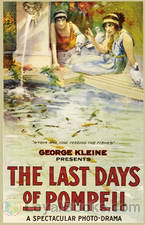 Last Days of Pompeii
Last Days of Pompeii
The Last Days of Pompeii, a novel by Edward George Bulwer-Lytton tells the love story of the Greeks Glaucus and Ione who were living in Pompeii when Mt. Vesuvius erupted and destroyed the city. But aside from telling their romance, the book is also full of insights about the decadent lifestyle of the Romans during the later part of their empire’s history. The different characters in the story represent the different civilizations which they come from. Glaucus, the main protagonist in the novel was portrayed as a handsome Greek nobleman... | |
 The Coming Race
The Coming Race
Edward George Earle Lytton Bulwer-Lytton, 1st Baron Lytton (1803-1873) was an English novelist, poet, playright, and politician. Lord Lytton was a florid, popular writer of his day, who coined such phrases as “the great unwashed”, “pursuit of the almighty dollar”, “the pen is mightier than the sword”, and the infamous incipit “It was a dark and stormy night.” Despite his popularity in his heyday, today his name is known as a byword for bad writing. San Jose State University holds... | |
 Zanoni
Zanoni
Zanoni, a timeless Rosicrucian brother, cannot fall in love without losing his power of immortality; but he does fall in love with Viola Pisani, a promising young opera singer from Naples, the daughter of Pisani, a misunderstood Italian violinist. An English gentleman named Glyndon loves Viola as well, but is indecisive about proposing marriage, and then renounces his love in order to pursue occult study. The story develops in the days of the French Revolution in 1789. Zanoni has lived since the Chaldean civilization... | |
By: Edward Gibbon (1737-1794) | |
|---|---|
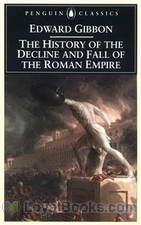 History of the Decline and Fall of the Roman Empire
History of the Decline and Fall of the Roman Empire
Spanning a period of nearly 1500 years, this monumental work of history tracks the orbit of one of the greatest Empires of all time. The sheer scale and sweep of the narrative is breathtaking in its ambitious scope and brings to vivid life the collapse of a magnificent military, political and administrative structure. Proceeding at a brisk pace, the original fourteen volumes describe debauched emperors, corrupt practices, usurpers and murderers, bloody battles, plunder and loot, barbarian hordes, tumultuous events like the Crusades and invaders like Genghis Khan and many more... | |
By: Edward Gilliat (1841-1915) | |
|---|---|
 Romance Of Modern Sieges; Describing The Personal Adventures, Resource And Daring of Besiegers and Besieged In All Parts Of The World
Romance Of Modern Sieges; Describing The Personal Adventures, Resource And Daring of Besiegers and Besieged In All Parts Of The World
Lively narratives of some of the great siege battles of war. The book was written before World War I, in 1908. Some of the narratives contain language which was common in 19th and early twentieth century usage but which listeners today may find offensive. | |
By: Edward Granville Browne | |
|---|---|
 A year amongst the Persians; impressions as to the life, character, and thought
A year amongst the Persians; impressions as to the life, character, and thought
Edward Granville Browne (1862 – 1926), born in Stouts Hill, Uley, Gloucestershire, England, was a British orientalist who published numerous articles and books of academic value, mainly in the areas of history and literature. His works are respected for their scholarship, uniqueness, and style. He published in areas which few other Western scholars had explored to any sufficient degree. He used a language and style that showed high respect for everybody, even toward those he personally did not view in positive light... | |
By: Edward H. Hurlbut | |
|---|---|
 Lanagan Amateur Detective
Lanagan Amateur Detective
This is a 1913 collection of ten short detective stories by a not well known writer. Jack Lanagan is a police reporter for a daily newspaper in San Francisco, who has the confidence of the chief of police and access to all sorts of levels of city life. - Summary by David Wales | |
By: Edward Hilton | |
|---|---|
 History of the Earthquake and Fire in San Francisco
History of the Earthquake and Fire in San Francisco
Early in the morning of Wednesday, April 18, 1906, the San Francisco area was shaken by a massive earthquake. Over the course of the next four days, fires spread through large swaths of the city, started by broken gas lines, fallen electrical wiring, and damaged chimneys. Broken water mains prevented the fire department from effectively battling the blazes. By the time the fires were finally extinguished on the afternoon of Saturday, April 21, nearly 3000 people were dead and 500 city blocks destroyed... | |
By: Edward Irenaeus Prime-Stevenson (1858-1942) | |
|---|---|
 Left to Themselves
Left to Themselves
Said to be the first-ever gay youth novel, this 1891 story follows the adventures of 12-year-old Gerald Saxton embarking on a trip from New York, to meet his father in Nova Scotia. He is chaperoned by 17-year-old Philip Touchtone. During the trip, their steamer sinks, they are shipwrecked, and marooned on an island. In addition, a shady antagonist is stalking the two. And while all this is happening, a friendship of mutual affection develops between the boys . - Summary by Donald Cummings | |
 White Cockades: An Incident of the "Forty-Five"
White Cockades: An Incident of the "Forty-Five"
In the aftermath of the 1745 Jacobite uprising, the young Andrew Boyd meets a fugitive from the redcoats, a man whom Andrew soon grows to admire. Andrew and his father take the man in, but then the redcoats arrive to search the house... Besides being a historical adventure this reads, to a modern reader, as a sweet gay romance, though it's not explicit. Indeed the author was gay himself and anonymously recommended his own book as an example of homoerotic fiction in The Intersexes, his 700-page defense of homosexuality under another pen name. - Summary by Elin | |
By: Edward J. Ruppelt (1923-1960) | |
|---|---|
 The Report on Unidentified Flying Objects
The Report on Unidentified Flying Objects
'Straight from the horse's mouth', as they say. Edward Ruppelt was the first head of the U.S. Air Force's Project Blue Book, the official project initiated to investigate UFO reports beginning in 1952. This report from 1956 takes us inside these initial investigations, separates fact from fiction, and gives insight into who, when, where, and how sightings were reported and researched in open-minded fashion (for which Ruppelt was renowned), rather than in the typical hushed and secretive (and censored) manner most often associated with government and military reports which are released to the public... | |
By: Edward Jenner (1749-1823) | |
|---|---|
 An Inquiry into the Causes and Effects of the Variolae Vaccinae
An Inquiry into the Causes and Effects of the Variolae Vaccinae
This collection of three publications details Edward Jenner's investigations into the connection between smallpox and coxpox, and the creation of the smallpox vaccine, the world's first vaccine. - Summary by Jordan | |
By: Edward Jesse (1780-1868) | |
|---|---|
 Anecdotes of Dogs
Anecdotes of Dogs
"Histories are more full of examples of the fidelity of dogs than of friends."The character, sensibilities, and intellectual faculties of animals have always been a favourite study, and they are, perhaps, more strongly developed in the dog than in any other quadruped, from the circumstance of his being the constant companion of man. I am aware how much has been written on this subject, but having accumulated many original and interesting anecdotes of this faithful animal, I have attempted to enlarge the general stock of information respecting it... | |
By: Edward Keble Chatterton (1878-1944) | |
|---|---|
 Romance of Piracy
Romance of Piracy
The Library of Romance is a series of books concerning the romance of scientific facts, be it biology, chemistry, history, or politics. This volume is one of history, concerning an account of the known facts of piracy, starting with the Vikings, and arching in history and geography toward an account of piracy in Chinese waters at around the time of publication of this volume . - Summary by Carolin | |
 Daring Deeds of Famous Pirates
Daring Deeds of Famous Pirates
Edward Chatterton, a prolific British author of maritime adventures, presents fascinating stories of pirates and their exploits from earliest times through the 19th century. Chapters include the history of piracy in Tudor and Elizabethan times and stories of legendary pirates such as Black Beard, Henry Morgan, and Captain Kidd. - Summary by Larry Wilson | |
By: Edward Knatchbull-Hugesson (1829-1893) | |
|---|---|
 Uncle Joe's Stories
Uncle Joe's Stories
This is an entertaining collection of varying stories recounted as only a master storyteller could deliver them. | |
By: Edward L. Wheeler (1854-1885) | |
|---|---|
 Deadwood Dick's Doom; or, Calamity Jane's Last Adventure
Deadwood Dick's Doom; or, Calamity Jane's Last Adventure
This western, published around 1899, is a dime novel that has it all: roguish gun men, hostile Indians, chilvarous gentlemen to protect the hapless females, and – in Calamity Jane – even a female who can hold her own. The fictional character of the hero, Deadwood Dick, appeared in more than a hundred stories and became so famous the name was claimed by several men who actually lived in Deadwood, South Dakota. | |
By: Edward Lamplough (1845-1919) | |
|---|---|
 Yorkshire Battles
Yorkshire Battles
Edward Lamplough describes 22 battles that all occurred in Yorkshire over many time periods and political contexts. - Summary by lightcrystal | |
By: Edward Lawton Moss (1843-1880) | |
|---|---|
 Shores of the Polar Sea: A Narrative of the Arctic Expedition of 1875-6
Shores of the Polar Sea: A Narrative of the Arctic Expedition of 1875-6
"THE ARCTIC EXPEDITION of 1875 left England on 29th May, crossed the Atlantic to Davis Straits in a succession of storms, and entered the Arctic regions on 4th July. It sailed with orders to 'attain the highest northern latitude, and, if possible, reach the Pole.'" This is the story of the crew of the HMS Alert, on its voyage of exploration up the Baffin Sea and toward northern Greenland. volunteers wish to thank the volunteers of Distributed Proofreaders for their work over the last 20 years to convert public domain books into e-books. "Shores of the Polar Sea" was DP's 35,000th title. Congratulations and Happy 20th Anniversary Distributed Proofreaders! . | |
By: Edward Lear (1812-1888) | |
|---|---|
 A Book of Nonsense
A Book of Nonsense
In 1846 Lear published A Book of Nonsense, a volume of limericks that went through three editions and helped popularize the form. This book contains 112 of these funny, imaginative verses that have been well loved by many generations of children (and adults). ( | |
 Nonsense Songs, Stories, Botany and Alphabets
Nonsense Songs, Stories, Botany and Alphabets
A selection of nonsense poems, songs (not sung!), stories, and miscellaneous strangeness. The work includes the "Owl and the Pussycat" and a recipe for Amblongus Pie, which begins "Take 4 pounds (say 4½ pounds) of fresh ablongusses and put them in a small pipkin."Edward Lear was an English writer, poet, cat-lover, and illustrator (his watercolours are beautiful). This recording celebrates the 200th anniversary of Lear's birth. | |
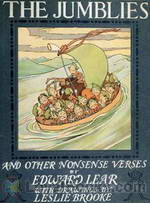 Nonsense Verses by Edward Lear
Nonsense Verses by Edward Lear
This is a collection of some of the delightful nonsense verses and stories by Edward Lear. A lot of them are also my favorites. The Jumblies, The Owl and the Pussy-cat; the Broom, the Shovel, The Poker and the Tongs; The Duck and the Kangaroo; The Cummerbund; The Dong with the Luminous Nose; The New Vestments; Calico Pie; The courtship of the Yonghy-Bonghy-Bo and Incidents in the Life of My Uncle Arly. Also included at no extra cost are two sections with my favorite Lear limericks. Only about 30 of them but they are all funny and full of delectable silliness. I hope you enjoy listening to these as much as I enjoyed recording them. | |
 Laughable Lyrics
Laughable Lyrics
Hillarious, fantastic poems that I enjoyed reading to my two sons when they were little. Now I'd like to read them for anyone's children to enjoy listening to. | |
By: Edward M. Bounds (1835-1913) | |
|---|---|
 The Essentials of Prayer
The Essentials of Prayer
The Sunday School Times says of the author, "he was a specialist in prayer and his books are for the quiet hour, for careful meditation and for all who wish to seek and find the treasures of God." This book is a ready helper for those who want to follow his path, with more and better communication with the Lord. | |
By: Edward M. Forster (1879-1970) | |
|---|---|
 Howards End
Howards End
It's sad, but true to say that today Edward Morgan Forster's works are known more from their film and television adaptations rather than from their original novels. Yet, these adaptations have spurred many a fascinated viewer into going back to the library and finding the book that the film or miniseries was based on and this is ultimately the power of Forster's literary appeal. Howard's End was published in 1910 and it marked Forster's first taste of critical and commercial success. He had published three other novels earlier, Where Angels Fear To Tread (1905), The Longest Journey (1907) and A Room With a View (1908) but none of them had been received with so much acclaim... | |
 A Room With a View
A Room With a View
A Room With a View opens with Two Englishwomen touring Europe. The older one is poor, bossy, old fashioned and a great upholder of what is “proper.” The younger one is less certain of herself, but holds within her the makings of a passionate, emotional and independent woman. In Florence they are allotted a room overlooking a dull courtyard, whereas they had specifically asked for a “view.” A fellow guest offers them his own rooms which offer wonderful vistas of the Arno. The older woman instead of appreciating his courtesy, sees this as a breach of propriety... | |
 Where Angels Fear to Tread
Where Angels Fear to Tread
On a journey to Tuscany with her young friend and traveling companion Caroline Abbott, widowed Lilia Herriton falls in love with both Italy and a handsome Italian much younger than herself, and decides to stay. Furious, her dead husband’s family send Lilia’s brother-in-law to Italy to prevent a misalliance, but he arrives too late. Lilia marries the Italian and in due course becomes pregnant again. When she dies giving birth to her child, the Herritons consider it both their right and their duty to travel to Monteriano to obtain custody of the infant so that he can be raised as an Englishman. | |
 The Machine Stops
The Machine Stops
"The Machine Stops" is a science fiction short story by E. M. Forster. After initial publication in The Oxford and Cambridge Review (November 1909), the story was republished in Forster's The Eternal Moment and Other Stories in 1928. After being voted one of the best novellas up to 1965, it was included that same year in the populist anthology Modern Short Stories. The story describes a world in which most of the human population has lost the ability to live on the surface of the Earth. Each individual now lives in isolation below ground in a standard 'cell', with all bodily and spiritual needs met by the omnipotent, global Machine. | |
 The Longest Journey
The Longest Journey
Frederick Elliot is a student at early 20th century Cambridge, a university that seems like paradise to him, amongst bright if cynical companions, when he receives a visit from two friends, an engaged young woman, Agnes Pembroke, and her older brother, Herbert. The Pembrokes are Rickie’s only friends from home. An orphan who grew up living with cousins, he was sent to a public (boarding) school where he was shunned and bullied because of his lame foot, an inherited weakness, and frail body. Agnes, as it happens, is engaged to Gerald, now in the army, who was one of the sturdy youths who bullied Rickie at school... | |
 Room with a View (version 3 dramatic reading)
Room with a View (version 3 dramatic reading)
A Room with a View is a 1908 novel by English writer E. M. Forster, about a young woman in the repressed culture of Edwardian era England. Set in Italy and England, the story is both a romance and a critique of English society at the beginning of the 20th century. | |
 Machine Stops (version 4)
Machine Stops (version 4)
"The Machine Stops" is a science fiction story by E. M. Forster. After initial publication in 1909 the story was republished in Forster's The Eternal Moment and Other Stories in 1928. After being voted one of the best novellas up to 1965, it was included that same year in the populist anthology Modern Short Stories. In 1973 it was also included in The Science Fiction Hall of Fame, Volume Two. The story is particularly notable for predicting new technologies such as instant messaging and the Internet... | |
By: Edward M. House (1858-1938) | |
|---|---|
 Philip Dru: Administrator
Philip Dru: Administrator
Philip Dru: Administrator: a Story of Tomorrow, 1920-1935 is a futuristic political novel published anonymously in 1912 by Edward Mandell House, an American diplomat, politician and presidential foreign policy advisor. His book's hero leads the democratic western U.S. in a civil war against the plutocratic East, and becomes the dictator of America. Dru as dictator imposes a series of reforms that resemble the Bull Moose platform of 1912 and then vanishes. | |
By: Edward M. Hull (1880-1947) | |
|---|---|
 Sheik
Sheik
The novel on which the famous silent movie starring Rudolf Valentino was based. The plot is set in motion as Lady Conway disapproves of Diana's planning a desert trip with just her Arab guides to accompany her. Diana gets kidnapped by the Sheik, Ahmed Ben Hassan. Finally allowed to ride in the desert alone, she plans an escape. However, the Sheik recaptures her. And so the story unfolds. | |
By: Edward Ormondroyd | |
|---|---|
 David and the Phoenix
David and the Phoenix
David knew that one should be prepared for anything when one climbs a mountain, but he never dreamed what he would find that June morning on the mountain ledge. There stood an enormous bird, with a head like an eagle, a neck like a swan, and a scarlet crest. The most astonishing thing was that the bird had an open book on the ground and was reading from it! This was David’s first sight of the fabulous Phoenix and the beginning of a pleasant and profitable partnership. The Phoenix found a great... | |
By: Edward P. Roe (1838-1888) | |
|---|---|
 He Fell in Love with His Wife
He Fell in Love with His Wife
James desperately needs someone to help him keep his farm going, but has failure after colossal failure finding a good housekeeper. Alida marries a man only to find out he's already married. She's so undone when she finds out that she just wants to go somewhere where no one will judge her for her misfortune, where she can work and keep herself fed and clothed. James and Alida meet and arrange for a strictly business marriage, leaving loving and honoring out of the vows. The title of the book tells the rest of the story, but the way it gets there is worth the journey. (Introduction by TriciaG) | |
By: Edward Phillips Oppenheim (1866-1946) | |
|---|---|
 The Cinema Murder
The Cinema Murder
Phillip Romilly is a poor art teacher in London. He finds out that his wealthy cousin Douglas has been seeing his girl friend Beatrice behind his back. He strangles Douglas, throws him in the canal, and assumes his identity. Douglas had booked passage to America for the next day, so after a pleasant sea voyage Phillip arrives at the Waldorf Hotel in New York as Douglas Romilly. An hour after checking in he disappears again, and assumes yet another identity, one that his cousin had set up for himself. Douglas was facing massive financial problems, and he, too, had planned to avoid his problems by getting lost in the crowd in New York. Now, in chapter two…. | |
 The Zeppelin's Passenger
The Zeppelin's Passenger
The Zeppelin’s Passenger is a tale of German espionage in England during World War I. Dreymarsh is a fictional “backwater” area in England with no apparent military value. The story begins with Dreymarsh residents discovering an observation car from a German zeppelin along with a Homburg hat near Dreymarsh. The mystery is further complicated when an Englishman, Mr. Hamar Lessingham, presents himself at Mainsail Haul which is the residence of Sir Henry Cranston. Lessingham bears with him, hand-carried letters from Major Richard Halstead, and a British prisoner of war in Germany... | |
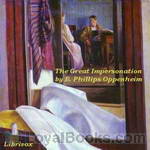 The Great Impersonation
The Great Impersonation
E. Phillips Oppenheim, an English novelist created well in excess of 100 novels and 30 plus collections of short stories. Most of his tales are thrillers and espionage. The Great Impersonation was written following World War I and is considered by many to be perhaps his best novel. The story focuses on German espionage in England prior to the start of World War I. The tale centers on two characters that are almost identical in appearance. Indeed, while both attend the same school in England, they are often mistaken for one another... | |
 The Avenger
The Avenger
Herbert Wrayson, a bachelor returns to his flat one night to find a young lady rifling his desk. He questions her and finds she thought she was in the apartment of his neighbor, Morris Barnes, who lives above him. While he is on the telephone, she quietly slips out of his flat and heads to Barnes’ abode. A few hours later, she is once again at his door – this time looking scared and faint. She asks Wrayson to escort her downstairs as the hallway is unlit. As they emerge, a hansom sits at the doorway with Morris Barnes in it... | |
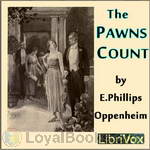 The Pawns Count
The Pawns Count
"I am for England and England only," John Lutchester, the Englishman, asserted."I am for Japan and Japan only," Nikasti, the Jap, insisted."I am for Germany first and America afterwards," Oscar Fischer, the German-American pronounced."I am for America first, America only, America always," Pamela Van Tale, the American girl, declared.They were all right except the German-American.It is during World War I. A chemist, Sandy Graham, has discovered a new powerful explosive, but he let's it slip in a London restaurant that he has made the discovery... | |
 An Amiable Charlatan
An Amiable Charlatan
An Englishman is enjoying his dinner at Stephano's, at which he is a regular diner. A man enters quickly, sits at his table, starts eating his food, and hands him a packet underneath the table! So begins Paul Walmsley's acquaintance - and adventures - with American adventurer Joseph H. Parker and his lovely daughter, Eve. (Intro by TriciaG)Note that there is an alternate reading of section 8. Both are excellent renditions, so enjoy either or both of them. | |
 Great Secret
Great Secret
English gentleman Hardross Courage has a good life. He has all the money he needs, enjoys sports and hunting, manages the family estate, and in general leads a satisfying life. On a trip to London to participate in a cricket match, Hardross is confronted by a man who forces his way into his hotel room imploring him to hide him. His reason - “They want to kill me”. So begins a tale that is likely to change Hardross' idyllic life forever to one of mystery and espionage. | |
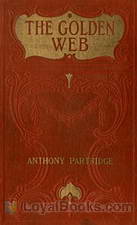 Golden Web
Golden Web
Stirling Deane has sold the Little Anna Gold Mine which he discovered in South Africa. The sale has made him a rich man and the head of the company to which he sold the mine. A former acquaintance from his days in South Africa has shown up and claims that he has the original deed to the mine and that he is in fact the owner of the mine. Shortly after a meeting with Deane, the man is found murdered and the deed he claims to have had is missing. Another man which Deane hired to negotiate the return of the deed to Deane is accused of the murder, tried, and sentenced to death. What has become of the lost deed? | |
 Havoc
Havoc
Havoc occurs when European countries are discussing covert alliances. The story revolves around the creation of a secret alliance between Germany, Russia, and Austria. The English hope to split Russia away by holding the Czar to his previous public commitments, but they need proof of what was done to create the pressure. All the pressures that lead to WWI are there, but the intrigues and secret treaties create an interesting background to the twists and turns of the plot. | |
 Jacob's Ladder
Jacob's Ladder
| |
 Devil's Paw
Devil's Paw
A beautiful, intelligent young woman – is she a traitorous spy or a patriot? An aristocratic soldier permanently injured during the war – is he a patriot or is there more to him than meets the eye? A clandestine meeting on a beach – espionage or peace movement? | |
 Double Traitor
Double Traitor
The setting is the years prior to the outbreak of World War I. It is a time when Germany is outwardly preparing for war but Britain continues to believe it is invincible and that no one would challenge her. A vast German spy network flourishes in England, often in plain view. The main character is Francis Norgate, an aspiring British diplomat who falls in disfavor with his superiors for defending a woman while stationed in Berlin. The resulting scandal causes Norgate to be recalled. On the way home, he meets a German gentleman, Selingman, who claims to be a crockery salesman... | |
 Vanished Messenger
Vanished Messenger
A conference of European nations is being held in the Hague. England has not been invited to attend. Some think war is about to break out. Mr. John P. Dunster, an American, is traveling to the Hague with an important document that may prevent the outbreak of war when he mysteriously disappears after a train wreck in England. Richard Hamel is asked by the British government to attempt to solve the mystery of Dunster’s disappearance and prevent the outbreak of war in Europe. | |
 Yellow House
Yellow House
Vicar and his two daughters move to a small, quiet country village and soon learn that their neighbor in the yellow house holds secrets that will change everything they thought to be real in their lives. | |
 Amiable Charlatan (version 2)
Amiable Charlatan (version 2)
A lively adventure of a father-daughter con team enjoying themselves in Edwardian London. | |
 Stolen Idols
Stolen Idols
Two temple statues, one with the most beautiful of features, the other a hideous sight, are at the core of this tale of adventure and the supernatural. Carved by Chinese craftsmen, they have stood to either side of the great Buddha for hundreds of years, worshipped and protected by generations of priests.Taken together, they represent human nature in balance, the spiritual with the bestial, the Soul with the Body. But what if they are separated? Ancient legend warns of disaster to anyone who disturbs that balance... | |
By: Edward Powys Mathers (1892-1939) | |
|---|---|
 Walking Up A Hill At Dawn
Walking Up A Hill At Dawn
volunteers bring you 17 recordings of Walking Up A Hill At Dawn by Edward Powys Mathers. This was the Weekly Poetry project for August 18, 2019. ------ This poem is taken from The Garden Of Bright Waters - One Hundred And Twenty Asiatic Love Poems Translated by Edward Powys Mathers, 1920 - Summary by David Lawrence | |
 Coloured Stars: versions of fifty Asiatic love poems
Coloured Stars: versions of fifty Asiatic love poems
"There is an opportunity of knowing in brilliant English translations much of the poetry of China and Japan, of India and Persia; and Arabic poetry is accessible ; but I believe this book to be the first general English anthology of Asiatic verse. It is haphazard, as such books must be until some polyglot scholar gives a whole life to the matter. Variety was the only aim possible in a space so small, and therefore I have selected love poems of different centuries and of both primitive and subtle peoples." - Summary by Author | |
By: Edward Quintard (1867-1936) | |
|---|---|
 Sea Babies and Other Babies
Sea Babies and Other Babies
This is a volume of small, dreamy poems by Edward Quintard. The poems could all make good lullabies, and can be read or told to very young children. Their parents or other grown-ups will also enjoy them. - Summary by Carolin | |
By: Edward R. Pease (1857-1955) | |
|---|---|
 History of the Fabian Society
History of the Fabian Society
"The History of the Fabian Society" describes the growth of Socialist theory in England, and the influence of Socialism on the political thought of the last thirty years - Summary by Robert Morel | |
By: Edward R. Shaw (1855-1903) | |
|---|---|
 Discoverers and Explorers
Discoverers and Explorers
Tales of the brave and daring explorers that ventured into the unknown “Sea of Darkness” where it was thought monsters and angry gods lived. They dared to sail near the equator which was thought to have such intense heat that it would boil the ocean water. It was also commonly thought at the time that the world was flat, and the ships would fall off the face of the earth. These men overcame these fears to explore and discover new lands. | |
By: Edward S. Ellis (1840-1916) | |
|---|---|
 The Life of Kit Carson
The Life of Kit Carson
Christopher Carson, or as he was familiarly called, Kit Carson, was a man whose real worth was understood only by those with whom he was associated or who closely studied his character. He was more than hunter, trapper, guide, Indian agent and Colonel in the United States Army....His lot was cast on the extreme western frontier, where, when but a youth, he earned the respect of the tough and frequently lawless men with whom he came in contact. Integrity, bravery, loyalty to friends, marvelous quickness... | |
 Steam Man of the Prairies
Steam Man of the Prairies
Ethan Hopkins and Mickey McSquizzle-a "Yankee" and an "Irishman"-encounter a colossal, steam-powered man in the American prairies. This steam-man was constructed by Johnny Brainerd, a teenaged boy, who uses the steam-man to carry him in a carriage on various adventures. | |
 Bill Biddon, Trapper
Bill Biddon, Trapper
Our young hero and his companion plan to make their fortunes in the California gold rush. Having made their way to Missouri, they join a wagon train headed for the famed Oregon Trail, but being carefree and adventuresome young men, they are not happy relaxing by the fireside of an evening. Encounters with animals, raging rivers and "Injuns" keep them interested in their voyage, but what will the Pacific Coast hold for them? | |
By: Edward S. Van Zile (1863-1931) | |
|---|---|
 Perkins, the Fakeer: A Travesty on Reincarnation
Perkins, the Fakeer: A Travesty on Reincarnation
As the title suggests we are treated to three humourous and curious psychical transpositions in the cases of "When Reginald was Caroline," "How Chopin came to Remsen," and "Clarissa's troublesome baby" . If you're looking for a break from more serious fare you can count on this one to amuse and entertain you. Summary by Celine Major. | |
By: Edward Sharpham (1576-1608) | |
|---|---|
 Cupid's Whirligig
Cupid's Whirligig
Cupid's Whirligig is a city comedy: a play in colloquial language dealing with the everyday life of London's citizens. A knight, Sir Timothy Troublesome, suspects his wife of cheating on him and, to prove that any children she bears are not his own, decides to 'geld' himself. Meanwhile, the young Lord Nonsuch dreams of bedding the knight's wife, and in disguise enters the Troublesomes' employ as a servant. Cupid descends from the heavens to cast a love spell on the citizens of London and, by the last act, one character loves another, who loves another, and so on until the last loves the first: a "Cupid's whirligig"... | |
By: Edward Sheldon (1886-1946) | |
|---|---|
 Boss
Boss
The Boss centers on the relationship between Michael Regan, an Irish-American businessman, and Emily Griswold, an outspoken American girl bent on saving her father's business. Set during a time when unions fought for wages and bosses fought for more stake in their company, the play's relevance strikes at the heart of economic issues and hardships in modern day America. | |
By: Edward Spencer (1844-1910) | |
|---|---|
 Cakes & Ale, A Dissertation on Banquets Interspersed with Various Recipes, More or Less Original, and anecdotes, mainly veracious
Cakes & Ale, A Dissertation on Banquets Interspersed with Various Recipes, More or Less Original, and anecdotes, mainly veracious
A long time ago, an estimable lady fell at the feet of an habitual publisher, and prayed unto him:—“Give, oh! give me the subject of a book for which the world has a need, and I will write it for you.”“Are you an author, madam?” asked the publisher, motioning his visitor to a seat.“No, sir,” was the proud reply, “I am a poet.”“Ah!” said the great man. “I am afraid there is no immediate worldly need of a poet. If you could only write a good cookery book, now! ... What I want,” said the publisher, “is a series of essays on food, a few anecdotes of stirring adventure—you have a fine flow of imagination, I understand—and a few useful, but uncommon recipes... | |
By: Edward Stratemeyer (1862-1930) | |
|---|---|
 The Rover Boys on the Ocean
The Rover Boys on the Ocean
The hearty, all-American Rover Boys sail by yacht to Africa in search of their kidnapped father. | |
 Outdoor Chums in the Big Woods
Outdoor Chums in the Big Woods
“That looks like a challenge, Frank.” “It was well fired, at any rate, Bluff!” “I should say yes, because it knocked my hat clear off my head. Do we stand for that sort of thing, or shall we accept the dare?” “There are half a dozen and more of the enemy against four Outdoor Chums, but what of that? This is the first snow of the fall, with a real tang in the air. Say yes, Frank, and let’s get busy!” “Here are Bluff and Jerry ready to eat up that crowd in a snowball fight. What... | |
By: Edward Streeter (1891-1976) | |
|---|---|
 Dere Mable
Dere Mable
Bill is in training camp, preparing to go off to World War I. This book is a collection of love letters written to his sweetheart, Mable. The letters are humorous, mis-spelled, and have many stories of life in an army camp – all from Bill’s unique perspective. | |
By: Edward Summers Squier | |
|---|---|
 Etiquette Made Easy
Etiquette Made Easy
"A complete dictionary [sic] containing the right information for any and all occasions." - Summary by KevinS | |
By: Edward Taylor Fletcher (1816-1897) | |
|---|---|
 Lost Island of Atlantis
Lost Island of Atlantis
In this paper, read before the Literary and Historical Society, Quebec, Fletcher demonstrates methodically what he perceives as evidence for the existence of the island of Atlantis. He begins by documenting the historical instances Atlantis is referred to in ancient texts, even if only as a myth , continues on to analyze linguistic elements that might indicate an Atlantean origin , and also presents a connection between the American and the European fossil flora and amber fauna, suggesting that Atlantis is the missing link ... | |
By: Edward Thomas (1878-1917) | |
|---|---|
 Poems by Edward Thomas
Poems by Edward Thomas
Born in 1878, Thomas published his first book when he was 18. Having married while still at university, he supported his family by writing articles and books, some in the form of what we might call slow travel writing, compiled on walks throughout England and Wales. He came to poetry late, encouraged by Robert Frost, and wrote 144 poems between 1914, and 1917 when he was killed, two years after enlisting, and shortly after arriving in France. His poetic life coincided with WW1, and though not a war poet, his is the poetry of loss, of life as it would never be again... | |
By: Edward Tyas Cook (1857-1919) | |
|---|---|
 Life of Florence Nightingale, Volume 2
Life of Florence Nightingale, Volume 2
A history of Florence Nightingale , the founder of modern nursing. Here's the definitive biography, gleaned from a lifetime of her notes, letters and writings, that goes way beyond the mere legend of "The Lady With The Lamp", and the "Founder Of Modern Nursing". This well written saga covers the vastly more expanded story of her development into an intelligent woman with a high purpose, her social standing and family connections that opened many doors for her, her extensive work after the Crimean War working with governments to develop better health care delivery systems to the indigent in England and in India, and her voluminous writings on numerous topics... | |
 Life of Florence Nightingale, Volume 1
Life of Florence Nightingale, Volume 1
A history of Florence Nightingale , the founder of modern nursing. Here's the definitive biography, gleaned from a lifetime of her notes, letters and writings, that goes way beyond the mere legend of "The Lady With The Lamp", and the "Founder Of Modern Nursing". This well written saga covers the vastly more expanded story of her development into an intelligent woman with a high purpose, her social standing and family connections that opened many doors for her, her extensive work after the Crimean War working with governments to develop better health care delivery systems to the indigent in England and in India, and her voluminous writings on numerous topics... | |
By: Edward V. Lucas (1868-1938) | |
|---|---|
 Highways and Byways in Sussex
Highways and Byways in Sussex
A very personal and opinionated wander through the Sussex of around 1900, illustrated with anecdotes, literary and poetic quotations, gravestone epitaphs and a gentle sense of humour. The author colours the countryside with his nostalgia for times past and regret for the encroaching future, his resentment of churches with locked doors, and his love of deer parks, ruined castles and the silent hills.(I must add my apologies for my attempts at the Sussex dialect in the chapter on that subject.)[This book is of Reading Grade of 9... | |
By: Edward W. Ludwig (1920-1990) | |
|---|---|
 Coffin for Jacob
Coffin for Jacob
Recently graduated and now a junior astrogator, Ben Carson punches an irritating drunkard in Luna City, killing him with one punch. Fleeing the scene, he heads to Venus. There was just one flaw in his decision. He hadn't realized that the memory of the dead man's face would haunt him, torment him, follow him as constantly as breath flowed into his lungs. But might not the rumble of atomic engines drown the murmuring dead voice? Might not the vision of alien worlds and infinite spaceways obscure the dead face? Arriving on Venus, he joins an underground movement in exchange for their help. Unfortunately, his tortured conscience prevents his wholehearted commitment to their cause. | |
By: Edward Weitzel (1861-?) | |
|---|---|
 Intimate Talks with Movie Stars
Intimate Talks with Movie Stars
A collection of interviews originally published in Moving Picture World that aims to give the movie-mad public "intimate pen pictures of the stars of the screen." Weitzel interviews some of the most renowned film stars of the 1920s: Mary Pickford, Douglas Fairbanks, Lillian and Dorothy Gish, Gloria Swanson, Pearl White, and more! | |
By: Edward Whymper (1840-1911) | |
|---|---|
 Scrambles Amongst the Alps in the Years 1860-69
Scrambles Amongst the Alps in the Years 1860-69
Scrambles Amongst the Alps is one the great classics (some would say the greatest) of early mountaineering literature, and Edward Whymper (1840-1911) one of the leading figures of the early years of Alpine climbing. He is best known, of course, for his many attempts on the Matterhorn, and for the loss of four members of his climbing party after the successful first ascent of the peak in July, 1865. Although the Matterhorn stands in ways in the center of his book, there are descriptions of many other ascents as well, in the Alps of France and Italy, as well as those of Switzerland... | |
By: Edward Woodley Bowling (1837-1907) | |
|---|---|
 Climber's Dream
Climber's Dream
Edward Woodley Bowling was apparently a rector at the Church of All Saints in Houghton Conquest, Bedfordshire, England in the late 1800's, this poem is taken from Sagittulae, Random Verses. In this book's introduction he writes "The general reader will probably think that some apology is due to him from me for publishing verses of so crude and trivial a character. I can only say that the smallest of bows should sometimes be unstrung, and that if my little arrows are flimsy and light they will, I trust, wound no one." | |
By: Edwin Abbott Abbott (1838-1926) | |
|---|---|
 Flatland: A Romance of Many Dimensions
Flatland: A Romance of Many Dimensions
If you've never heard the term “Mathematical Fiction” before, Edwin Abbott Abbott's 1884 novella, Flatland can certainly enlighten you! Flatland: A Romance of Many Dimensions was published in 1884 and since then, it has been discovered and re-discovered by succeeding generations who have been delighted by its unique view of society and people. The plot opens with a description of the fictional Flatland. The narrator calls himself “Square” and asks readers to “Imagine a vast sheet of paper on which straight Lines, Squares, Triangles, Pentagons, Hexagons and other figures, instead of remaining fixed in their places, move freely about... | |
 Flatland: A Romance of Many Dimensions (version 2)
Flatland: A Romance of Many Dimensions (version 2)
This is a satirical novel written by Edwin A. Abbott, first published in 1884. Abbott uses a two-dimensional world, with himself as the protagonist, known simply as "A Square", to deride the Victorian aristocracy and its hierarchies. But the book has retained its value throughout the years for its unique portrayal of a two-dimensional world, and how a Sphere introduces the Square to the incomprehensible possibility of a third dimension. Once the square fully understands the third dimension, he suggests to the Sphere that even a fourth, fifth, or sixth dimension could exist... | |
By: Edwin Arlington Robinson (1869-1935) | |
|---|---|
 Man Against the Sky: A Book of Poems
Man Against the Sky: A Book of Poems
This is a volume of later Poetry by the famous American poet Edwin Arlington Robinson. | |
 Three Taverns: A Book of Poems
Three Taverns: A Book of Poems
This is a volume of poems by Edwin Arlington Robinson. This volume contains, among other poems, the famous poems The Valley of the Shadow and Lazarus. | |
 Captain Craig: A Book of Poems
Captain Craig: A Book of Poems
This is a volume of narrative poems by Edwin Arlington Robinson. - Summary by Carolin | |
 Town Down the River: A Book of Poems
Town Down the River: A Book of Poems
This is a volume of poetry by Edwin Arlington Robinson, dedicated to Theodore Roosevelt. This volume also contains his lesser known shorter poems as well as the well-known narrative poem Miniver Cheevy. - Summary by Carolin | |
 Miniver Cheevy
Miniver Cheevy
readers bring you 16 recordings of "Miniver Cheevy" by Edwin Arlington Robinson. This was the fortnightly poem for June 13, 2021.------ "Miniver Cheevy" is a narrative poem written by Edwin Arlington Robinson and first published in The Town Down the River in 1910. The poem relates the story of a hopeless romantic who spends his days thinking about what might have been if only he had been born earlier in time. - Summary by Wikipedia | |
 Children of the Night
Children of the Night
volunteers bring you 16 recordings of The Children of the Night by Edwin Arlington Robinson. This was the Fortnightly Poetry project for August 14, 2022. ----- The Children of the Night is from the book of the same title, by Edwin Arlington Robinson . He was apparently a favorite poet of Theodore Roosevelt. - Summary by Owlivia | |
By: Edwin Arnold Brenholtz (1859-1953) | |
|---|---|
 Recording Angel
Recording Angel
"The Recording Angel," by Edwin Arnold Brenholtz, is one of the earliest examples of an American proletarian novel, a work intended to promote social reform or political revolution among the working classes. The story's themes of economic inequality between producers and consumers, political collusion within the upper classes, and the loss of the middle class ring particularly true today, especially in a global context. Billed as a "romance of the future," the plot of this fictional account of class struggle between workingmen and trust magnates of the new industrial economy hinges on a unique electric machine, which did not exist in 1905, but is quite common today... | |
By: Edwin Carlile Litsey (1874-1970) | |
|---|---|
 Race Of The Swift
Race Of The Swift
This 1905 collection is of the author’s short animal stories, some previously published in magazines. - Summary by David Wales | |
By: Edwin Diller Starbuck (1866-1947) | |
|---|---|
 Psychology of Religion
Psychology of Religion
“The present volume is an excursus into individual psychology, and represents only one of several aspects of the psychology... “It is a purely empirical study into the Line of Growth in Religion in individuals, and an inquiry into the causes and conditions which determine it...” From the Introduction, p11.Diagrams from the text can be downloaded here. | |
By: Edwin E. Slosson (1865-1929) | |
|---|---|
 Easy Lessons in Einstein
Easy Lessons in Einstein
Published in 1920, Slosson’s Easy Lessons in Einstein is one of the first popularizations of Einstein’s theory of relativity. This book is meant to convey to the general reader the ideas of relativity in non-mathematical terms, by the use of thought experiements and pop-cultural references of the day. This edition also includes a short article by Einstein on Time, Space and Gravitation. | |
 Creative Chemistry
Creative Chemistry
Slosson reviews the transformation of alchemistry from an obscure and imprecise practice to the science of chemistry. Along the way, he explains how the modern industrial world now relies on fertilizers, explosives, textile materials, polymers and metals.By exploring the properties of a once undervalued element, the high strength of vanadium steel made the Ford car possible. Another element, cerium, appears in butane lighters and was once seen as a threat to the match industry in France.In his chapter on oils, Slosson reviews the development of hydrogenated oils, especially during WWII, in the search for a way to reuse otherwise discarded components of corn and cottonseed... | |